新概念英语三-Lesson 22 By heart课件 (共29张PPT)
文档属性
| 名称 | 新概念英语三-Lesson 22 By heart课件 (共29张PPT) | 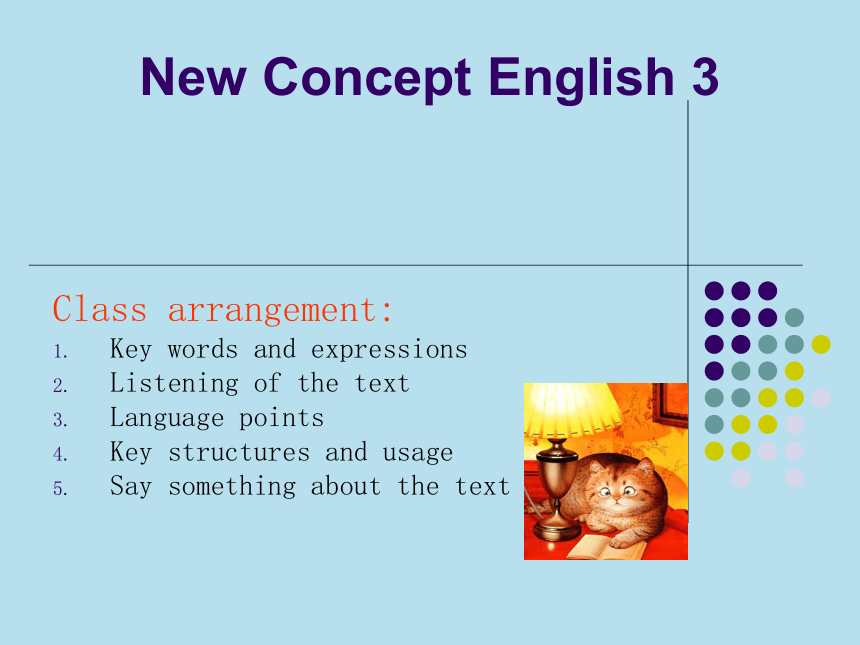 | |
| 格式 | ppt | ||
| 文件大小 | 682.0KB | ||
| 资源类型 | 教案 | ||
| 版本资源 | 新概念英语 | ||
| 科目 | 英语 | ||
| 更新时间 | 2024-01-01 09:17:09 | ||
图片预览

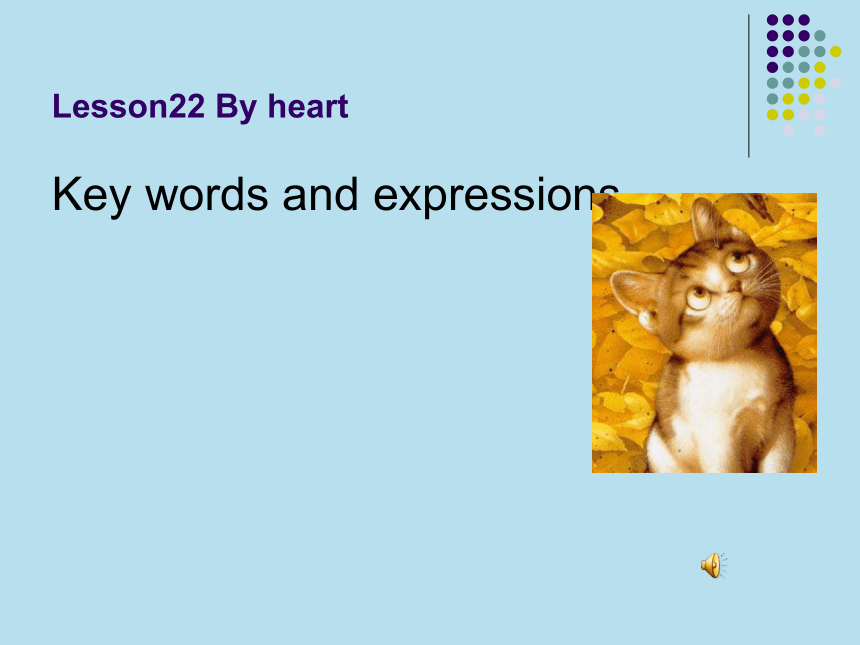
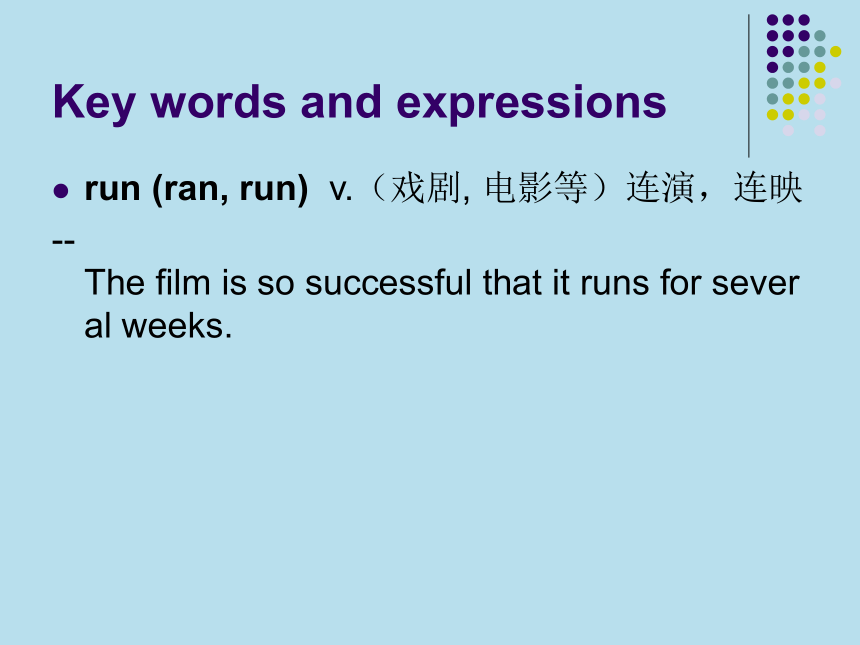
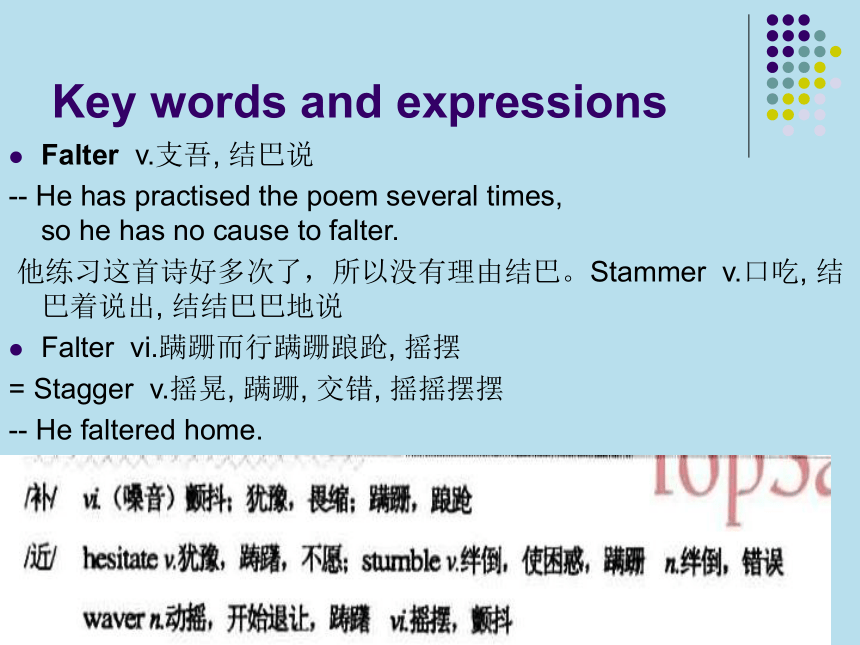
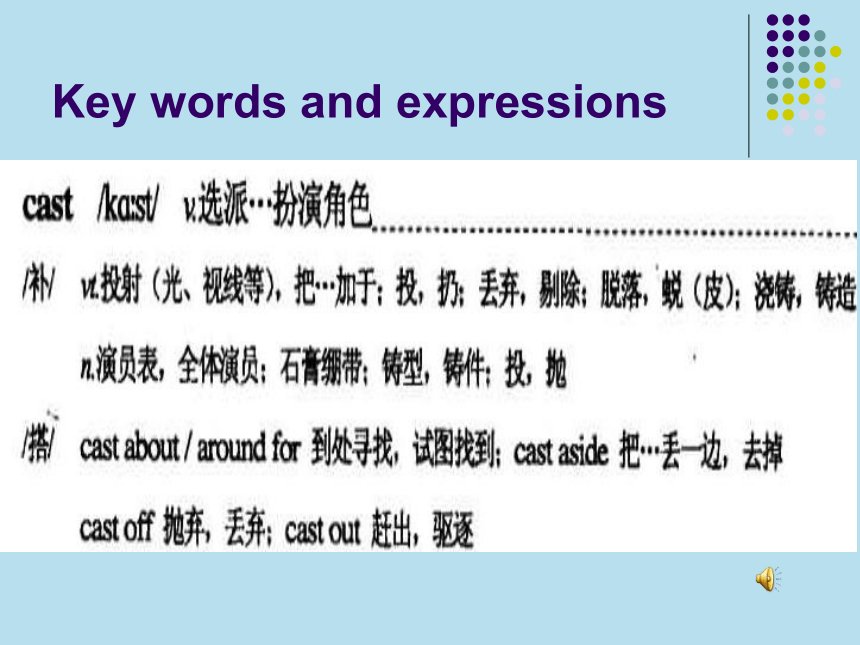
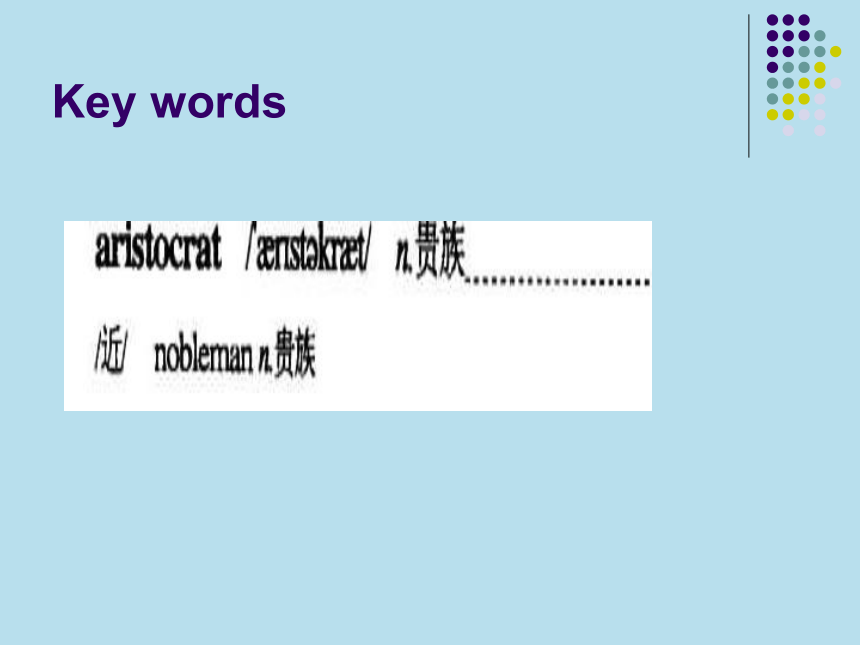
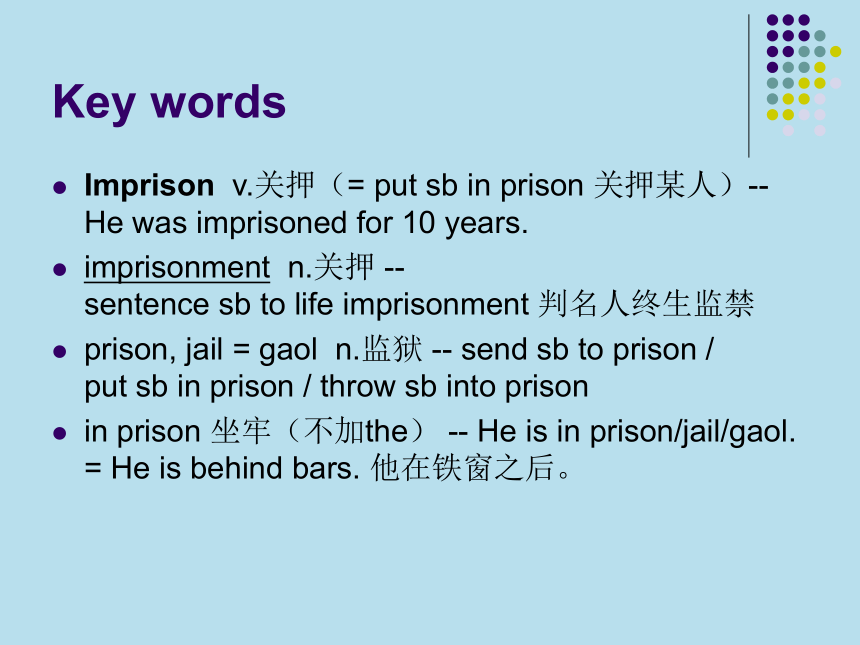
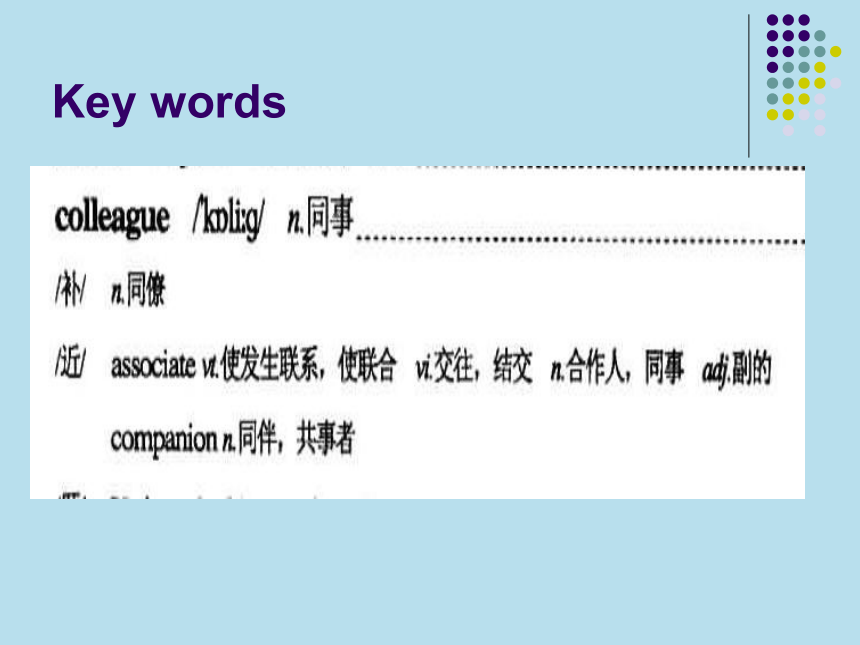
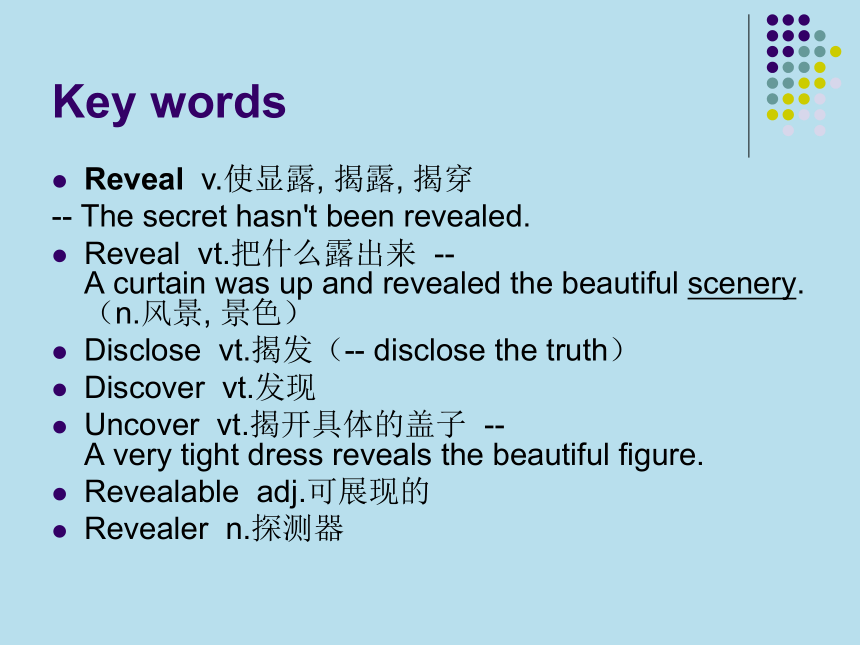
文档简介
(共30张PPT)
New Concept English 3
Class arrangement:
Key words and expressions
Listening of the text
Language points
Key structures and usage
Say something about the text
Lesson22 By heart
Key words and expressions
Key words and expressions
run (ran, run) v.(戏剧, 电影等)连演,连映
-- The film is so successful that it runs for several weeks.
Key words and expressions
Falter v.支吾, 结巴说
-- He has practised the poem several times, so he has no cause to falter.
他练习这首诗好多次了,所以没有理由结巴。Stammer v.口吃, 结巴着说出, 结结巴巴地说
Falter vi.蹒跚而行蹒跚踉跄, 摇摆
= Stagger v.摇晃, 蹒跚, 交错, 摇摇摆摆
-- He faltered home.
Key words and expressions
Key words
Key words
Imprison v.关押(= put sb in prison 关押某人)-- He was imprisoned for 10 years.
imprisonment n.关押 -- sentence sb to life imprisonment 判名人终生监禁
prison, jail = gaol n.监狱 -- send sb to prison / put sb in prison / throw sb into prison
in prison 坐牢(不加the) -- He is in prison/jail/gaol. = He is behind bars. 他在铁窗之后。
Key words
Key words
Reveal v.使显露, 揭露, 揭穿
-- The secret hasn't been revealed.
Reveal vt.把什么露出来 -- A curtain was up and revealed the beautiful scenery.(n.风景, 景色)
Disclose vt.揭发(-- disclose the truth)
Discover vt.发现
Uncover vt.揭开具体的盖子 -- A very tight dress reveals the beautiful figure.
Revealable adj.可展现的
Revealer n.探测器
Key words
Key words
squint v.眯着(眼)看, 瞄
squint one's eyes眯着眼睛 -- He squinted his eyes and looked at the letter.
pear at 眯着眼睛看
Key words
dim adj.昏暗
-- The room is too dim so I can't read the letter.
Gloomy adj.(天气,心情)抑郁的 -- The weather is gloomy today. / He is in gloomy mood.
Dusky adj.(天色)漆黑的, 黑暗的 -- Towards evening it’s getting dusky.
Murky adj.黑暗的, 阴沉的 -- I can't go out at murky night.
Misty adj.多雾的, 迷蒙的 -- The building is out of sight on such a misty day.
Key words
Proceed v.继续进行 (停顿之后的继续)
proceed to/with 进行继续某事
-- Let's proceed to business.
-- You must proceed with your work.
Proceed from… 从…着手开始继续
-- They proceed from lesson one.
proceed against sb 起诉某人
-- He decided to proceed against his neighbour.
Key words
Lesson22 By heart
Some plays are so successful that they run for years on end. In many ways, this is unfortunate for the poor actors who are required to go on repeating the same lines night after night. One would expect them to know their parts by heart and never have cause to falter. Yet this is not always the case.
A famous actor in a highly successful play was once cast in the role of an aristocrat who had been imprisoned in the Bastille for twenty years. In the last act, a gaoler would always come on to the stage with a letter which he would hand to the prisoner. Even though the noble was expected to read the letter at each performance, he always insisted that it should be written out in full. One night, the gaoler decided to play a joke on his colleague to find out if, after so many performances, he had managed to learn the contents of the letter by heart. The curtain went up on the final act of the play and revealed the aristocrat sitting alone behind bars in his dark cell. Just then, the gaoler appeared with the precious letter in his hands. He entered the cell and presented the letter to the aristocrat. But the copy he gave him had not been written out in full as usual. It was simply a blank sheet of paper. The gaoler looked on eagerly, anxious to see if his fellow-actor had at last learnt his lines. The noble stared at the blank sheet of paper for a few seconds. Then, squinting his eyes, he said: 'The light is dim. Read the letter to me.' And he promptly handed the sheet of paper to the gaoler. Finding that he could not remember a word of the letter either, the gaoler replied: 'The light is indeed dim, sire. I must get my glasses.' With this, he hurried off the stage. Much to the aristocrat's amusement, the gaoler returned a few moments later with a pair of glasses and the usual copy of the letter which he proceeded to read to the prisoner.
Language points
on end = continuously adv.连续的(位于具体的时间之后)
-- He sat there for hours on end.
-- We had hardly anything to eat for days on end.
on end = upright adv.竖着
-- The cat's fur stood on end.
-- I got a big shock, so my hair stood on end. 我被吓了一跳, 以至于我毛骨悚然
Language points
Go on doing 表示继续/接着做一直在做的事情,如:You oughtn’t go on living like that.
Go on to do sth. 继续/接着做另一件事的概念,如:She went on to tell us about her life in America.
Remember, forget, stop, regret
Language points
Would v. (will 的过去式)
1> [表示过去将来时, 用于第二、三人称](第一人称英国用 should, 美国用 would) 将, 会
-- He said he would come. 他说他要来。
2> [表示意愿]愿; 偏要, 肯
-- He would eat nothing. 他不肯吃东西; 他什么也不愿吃。
-- I told him not to go, but he would not listen. 我叫他别去, 可他偏不听。
-- He would go in spite of our warnings. 他不听我们的劝告, 执意要去。
3> [表示过去的习惯动作]常常, 总是
-- He would sit for hours doing nothing. 过去他常常 坐几个钟头什么事也不做。
-- He would come to see us on Sundays. 过去星期天他经常来看望我们。
4> [表示推测]大概, 该是
-- I would be about ten when my brother left home. 我哥哥离开家时, 我大概十岁左右。
5> [表示某种假设的意志]想要, 愿意
-- I could do so if I would. 要是我愿意, 我能够这样做(但我不愿意)。
-- If you would do this for me, I should be grateful indeed.
若是你愿意为我做这件事, 我将万分感激 。
6> [表示虚拟, 假设, 虚 构, 用于虚拟条件句的主句第二、第三人称, 美国也用于第一人称]
要, 会, 就会, 将要
-- They would be killed if the car went over the cliff. 如果汽车翻在悬崖下, 他们就会丧命。
-- They would have been killed if the car had gone over the cliff.
如果汽车当时翻到悬崖下, 他们早就丧命了。
8> [表示请求或个人想法、看法, 使语气更婉转]请
-- Would you kindly show me the way to the station 劳驾, 请问到车站的路怎么走
-- I would like to speak a few words. 我想讲几句话。
-- It would seem that he was right. 看来他倒是对的。
9> [表示假想的愿望]但愿, 要是...多好
-- Would [I would] that they were safe home again! 愿他们再能平安回家!
-- Would that I were young again. 我若能再年青些该多好啊!
-- We wish that he would come again. 我们但愿他会再来。
-- I would rather you came on Sunday. 希望你星期天来。
10> [表示能力](=could) 能
-- The barrel would hold 100 litres. 这桶能装一百升。
Language points
learn/know by heart 把什么牢记在心
-- The sentence is so important that you must learn it by heart.
heart and soul adv.全心全意的, 全身心的
-- We serve the students heart and soul.
take heart 鼓起勇气, 恢复信心
lose one’s heart 失去信心
lose one’s heart to sb = give one’s heart to sb 亲信于某人
-- The boy lost his heart to the girl.
put one's heart into sth 致力于某事
-- Nothing is difficult if you put your heart into it. 世上无难事, 只怕有心人。
have one's heart in one's boots 提心吊胆
He had his heart in his boots when he went out along at night.
Language points
在戏剧中,act 为“幕”之意,scene 指“场”。
A play in two acts. 两幕剧
Act 1, Scene 3, 第一幕第三场
Language points
even though = even if = though/although引导让步状语从句,表 尽管,即使 之意,如:
Even though you make great progress in your work, you shouldn’t be conceited.
Language points
insist(vt.坚决要求), suggest(vt.建议)
order(vt.命令), demand(vt.要求), require(vt.要求)
表示建议/要求/希望的动词加that宾语从句时, that从句必须使用should+动词原形的虚拟语气(should可以省略)。
Language points
in full = fully = completely
Language points
play a joke/cheek on sb 开某人玩笑 (cheek n.脸颊, 面颊)
Language points
on the final act = in the last act
Language points
present sth to = hand to = pass to
Language points
Anxious to see if … lines为一形容词短语,在句中作伴随状语。使文字显得更为生动。
Afraid of difficulties, they prefer to take the short cut.(原因)
由于害怕困难,他们宁愿走那条容易的路。
Overjoyed, she dashed out of the house.(伴随)
她高兴急了,急步跑出屋外。
Say something about the text
Thank you for listening, see you next time
New Concept English 3
Class arrangement:
Key words and expressions
Listening of the text
Language points
Key structures and usage
Say something about the text
Lesson22 By heart
Key words and expressions
Key words and expressions
run (ran, run) v.(戏剧, 电影等)连演,连映
-- The film is so successful that it runs for several weeks.
Key words and expressions
Falter v.支吾, 结巴说
-- He has practised the poem several times, so he has no cause to falter.
他练习这首诗好多次了,所以没有理由结巴。Stammer v.口吃, 结巴着说出, 结结巴巴地说
Falter vi.蹒跚而行蹒跚踉跄, 摇摆
= Stagger v.摇晃, 蹒跚, 交错, 摇摇摆摆
-- He faltered home.
Key words and expressions
Key words
Key words
Imprison v.关押(= put sb in prison 关押某人)-- He was imprisoned for 10 years.
imprisonment n.关押 -- sentence sb to life imprisonment 判名人终生监禁
prison, jail = gaol n.监狱 -- send sb to prison / put sb in prison / throw sb into prison
in prison 坐牢(不加the) -- He is in prison/jail/gaol. = He is behind bars. 他在铁窗之后。
Key words
Key words
Reveal v.使显露, 揭露, 揭穿
-- The secret hasn't been revealed.
Reveal vt.把什么露出来 -- A curtain was up and revealed the beautiful scenery.(n.风景, 景色)
Disclose vt.揭发(-- disclose the truth)
Discover vt.发现
Uncover vt.揭开具体的盖子 -- A very tight dress reveals the beautiful figure.
Revealable adj.可展现的
Revealer n.探测器
Key words
Key words
squint v.眯着(眼)看, 瞄
squint one's eyes眯着眼睛 -- He squinted his eyes and looked at the letter.
pear at 眯着眼睛看
Key words
dim adj.昏暗
-- The room is too dim so I can't read the letter.
Gloomy adj.(天气,心情)抑郁的 -- The weather is gloomy today. / He is in gloomy mood.
Dusky adj.(天色)漆黑的, 黑暗的 -- Towards evening it’s getting dusky.
Murky adj.黑暗的, 阴沉的 -- I can't go out at murky night.
Misty adj.多雾的, 迷蒙的 -- The building is out of sight on such a misty day.
Key words
Proceed v.继续进行 (停顿之后的继续)
proceed to/with 进行继续某事
-- Let's proceed to business.
-- You must proceed with your work.
Proceed from… 从…着手开始继续
-- They proceed from lesson one.
proceed against sb 起诉某人
-- He decided to proceed against his neighbour.
Key words
Lesson22 By heart
Some plays are so successful that they run for years on end. In many ways, this is unfortunate for the poor actors who are required to go on repeating the same lines night after night. One would expect them to know their parts by heart and never have cause to falter. Yet this is not always the case.
A famous actor in a highly successful play was once cast in the role of an aristocrat who had been imprisoned in the Bastille for twenty years. In the last act, a gaoler would always come on to the stage with a letter which he would hand to the prisoner. Even though the noble was expected to read the letter at each performance, he always insisted that it should be written out in full. One night, the gaoler decided to play a joke on his colleague to find out if, after so many performances, he had managed to learn the contents of the letter by heart. The curtain went up on the final act of the play and revealed the aristocrat sitting alone behind bars in his dark cell. Just then, the gaoler appeared with the precious letter in his hands. He entered the cell and presented the letter to the aristocrat. But the copy he gave him had not been written out in full as usual. It was simply a blank sheet of paper. The gaoler looked on eagerly, anxious to see if his fellow-actor had at last learnt his lines. The noble stared at the blank sheet of paper for a few seconds. Then, squinting his eyes, he said: 'The light is dim. Read the letter to me.' And he promptly handed the sheet of paper to the gaoler. Finding that he could not remember a word of the letter either, the gaoler replied: 'The light is indeed dim, sire. I must get my glasses.' With this, he hurried off the stage. Much to the aristocrat's amusement, the gaoler returned a few moments later with a pair of glasses and the usual copy of the letter which he proceeded to read to the prisoner.
Language points
on end = continuously adv.连续的(位于具体的时间之后)
-- He sat there for hours on end.
-- We had hardly anything to eat for days on end.
on end = upright adv.竖着
-- The cat's fur stood on end.
-- I got a big shock, so my hair stood on end. 我被吓了一跳, 以至于我毛骨悚然
Language points
Go on doing 表示继续/接着做一直在做的事情,如:You oughtn’t go on living like that.
Go on to do sth. 继续/接着做另一件事的概念,如:She went on to tell us about her life in America.
Remember, forget, stop, regret
Language points
Would v. (will 的过去式)
1> [表示过去将来时, 用于第二、三人称](第一人称英国用 should, 美国用 would) 将, 会
-- He said he would come. 他说他要来。
2> [表示意愿]愿; 偏要, 肯
-- He would eat nothing. 他不肯吃东西; 他什么也不愿吃。
-- I told him not to go, but he would not listen. 我叫他别去, 可他偏不听。
-- He would go in spite of our warnings. 他不听我们的劝告, 执意要去。
3> [表示过去的习惯动作]常常, 总是
-- He would sit for hours doing nothing. 过去他常常 坐几个钟头什么事也不做。
-- He would come to see us on Sundays. 过去星期天他经常来看望我们。
4> [表示推测]大概, 该是
-- I would be about ten when my brother left home. 我哥哥离开家时, 我大概十岁左右。
5> [表示某种假设的意志]想要, 愿意
-- I could do so if I would. 要是我愿意, 我能够这样做(但我不愿意)。
-- If you would do this for me, I should be grateful indeed.
若是你愿意为我做这件事, 我将万分感激 。
6> [表示虚拟, 假设, 虚 构, 用于虚拟条件句的主句第二、第三人称, 美国也用于第一人称]
要, 会, 就会, 将要
-- They would be killed if the car went over the cliff. 如果汽车翻在悬崖下, 他们就会丧命。
-- They would have been killed if the car had gone over the cliff.
如果汽车当时翻到悬崖下, 他们早就丧命了。
8> [表示请求或个人想法、看法, 使语气更婉转]请
-- Would you kindly show me the way to the station 劳驾, 请问到车站的路怎么走
-- I would like to speak a few words. 我想讲几句话。
-- It would seem that he was right. 看来他倒是对的。
9> [表示假想的愿望]但愿, 要是...多好
-- Would [I would] that they were safe home again! 愿他们再能平安回家!
-- Would that I were young again. 我若能再年青些该多好啊!
-- We wish that he would come again. 我们但愿他会再来。
-- I would rather you came on Sunday. 希望你星期天来。
10> [表示能力](=could) 能
-- The barrel would hold 100 litres. 这桶能装一百升。
Language points
learn/know by heart 把什么牢记在心
-- The sentence is so important that you must learn it by heart.
heart and soul adv.全心全意的, 全身心的
-- We serve the students heart and soul.
take heart 鼓起勇气, 恢复信心
lose one’s heart 失去信心
lose one’s heart to sb = give one’s heart to sb 亲信于某人
-- The boy lost his heart to the girl.
put one's heart into sth 致力于某事
-- Nothing is difficult if you put your heart into it. 世上无难事, 只怕有心人。
have one's heart in one's boots 提心吊胆
He had his heart in his boots when he went out along at night.
Language points
在戏剧中,act 为“幕”之意,scene 指“场”。
A play in two acts. 两幕剧
Act 1, Scene 3, 第一幕第三场
Language points
even though = even if = though/although引导让步状语从句,表 尽管,即使 之意,如:
Even though you make great progress in your work, you shouldn’t be conceited.
Language points
insist(vt.坚决要求), suggest(vt.建议)
order(vt.命令), demand(vt.要求), require(vt.要求)
表示建议/要求/希望的动词加that宾语从句时, that从句必须使用should+动词原形的虚拟语气(should可以省略)。
Language points
in full = fully = completely
Language points
play a joke/cheek on sb 开某人玩笑 (cheek n.脸颊, 面颊)
Language points
on the final act = in the last act
Language points
present sth to = hand to = pass to
Language points
Anxious to see if … lines为一形容词短语,在句中作伴随状语。使文字显得更为生动。
Afraid of difficulties, they prefer to take the short cut.(原因)
由于害怕困难,他们宁愿走那条容易的路。
Overjoyed, she dashed out of the house.(伴随)
她高兴急了,急步跑出屋外。
Say something about the text
Thank you for listening, see you next time
同课章节目录
